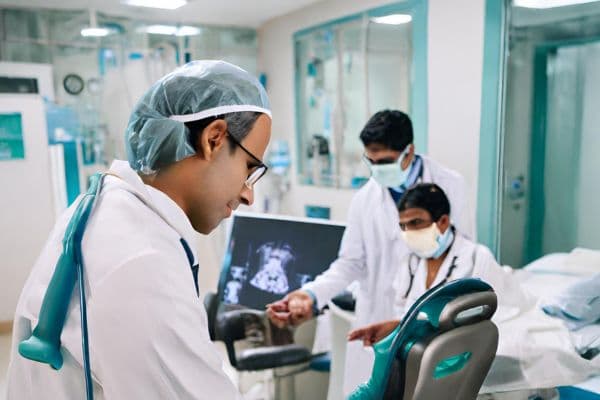Will AI Replace Doctors?

Abstract
The integration of AI in healthcare poses both opportunities and challenges. While AI's predictive nature and potential for mimicking human judgment offer promise, ethical concerns and the impact on traditional healthcare roles remain pivotal. AGI's imminent arrival underscores the need for proactive adaptation. Brain-Computer Interfacing heralds revolutionary treatment approaches. AI-driven chatbots and CDSS systems could reshape patient care, albeit with cautious oversight. Cost reduction and improved accessibility are foreseeable outcomes. Moreover, the emergence of new AI-centric healthcare professions underscores the transformative potential. In conclusion, while AI may not wholly supplant doctors, its integration promises a redefined healthcare landscape, demanding ethical foresight and innovative adaptation.I believe the question of whether AI will replace doctors is of significant importance, a concern that many medical professionals ponder and discuss amongst themselves, perhaps in a WhatsApp group or during gatherings. One certainty in this universe is change, and we must adapt to these changes. Having accepted change as the rule of nature, where nothing is constant, it would be wrong on our part to be adamant that this will never happen, or equally adamant to say it will happen. So, acknowledging both possibilities, let's delve deeper into this topic.
However, it's important to proceed with caution, as the discussion may inadvertently hurt the sentiments of those who have taken the medical profession seriously and have toiled hard in life to achieve it. It's not easy to accept the changes that may be forthcoming in the near future, especially for the next generation of healthcare professionals. Please note that I will avoid using the term "doctors" here to encompass a broader scope of healthcare providers.
What is AI?
Traditional computer programming is deterministic in nature, but AI is predictive in nature. Traditional programs are written keeping in mind all possible scenarios, but in AI, computers are fed with data and are made to learn how to get answers by training with large amounts of data. This is very much similar to human behavior.
Current AI programs are trained for specific problems in question, so they lack the ability in many aspects of human intellect. But what's actually coming in the near future is AGI.
What is AGI?
AGI, Artificial General Intelligence, is more like humanoid and can behave almost like humans and could be a replacement for humans, at least in some areas of our society. The prediction of AGI is not that far in the future; it will be a fact in less than a decade. AGI could mimic human judgment, empathy, and intuition like humans. This makes it much more impactful in delivering healthcare services. As of now, it is difficult to fully imagine the impact of AGI, but one thing is certain: there will be disruption in the way healthcare will be delivered in the future.
Brain-Computer Interfacing:
This is the beginning of a new era in healthcare sciences. Recently, Neuralink got FDA approval for phase 1 clinical human trials for insertion of a chip inside the human brain. This is for the treatment of paralysis. Brain-Computer Interfacing has many more applications like memory extension, memory sharing, and treatment of many brain diseases. BCI opens up a new dimension in healthcare delivery; there will be new kinds of professions that will emerge from these kinds of applications.
AI Chatbots and Clinical Decision Support Systems (CDSS):
The AI chatbots and CDSS of the future will become sufficiently knowledgeable to suggest treatment for patients with or without doctor help or by consulting a paramedical staff. These CDSS systems may even be able to statistically analyze and generate new set guidelines for the management of diseases, which could become binding on human doctors to follow, as they could be considered unbiased and less expensive forms of treatment by governments.
AI for reducing healthcare cost:
With the help of AI, governments could focus on reducing the healthcare cost by designing more and more efficient systems wherein human intervention could become less and less required. Remote healthcare may become the norm, and thus healthcare facility dependency to deliver the treatment becomes less and less in the future. Only in most required scenarios, patients may reach out to physical healthcare in the future. All these measures reduce the cost of treatment. Primary healthcare and even certain components of secondary healthcare could be taken by AI as they are less expensive, maybe more updated, and may even be less prone to error with sufficient training.
The emergence of new healthcare professions:
Absolutely, the integration of AI into healthcare could indeed give rise to entirely new professions or roles focused on leveraging AI technologies to treat diseases and improve patient outcomes. Here are some potential scenarios:
1. AI Healthcare Specialist: This role could involve professionals who specialize in utilizing AI algorithms and tools to assist in diagnosing diseases, creating personalized treatment plans, and monitoring patient progress. These specialists would require a deep understanding of both medical concepts and AI technology to effectively leverage these tools in clinical practice.
2. AI Ethics Consultant: With the increasing use of AI in healthcare, there will be a growing need for experts who can navigate the ethical considerations surrounding AI-driven diagnosis, treatment, and patient care. AI ethics consultants could help ensure that AI systems are deployed responsibly, address concerns related to bias and fairness, and uphold patient privacy and autonomy.
3. AI Implementation Manager: Implementing AI technologies in healthcare settings requires careful planning, coordination, and integration with existing systems and workflows. AI implementation managers could oversee the deployment of AI solutions, train healthcare professionals on their use, and monitor performance to ensure optimal outcomes.
4. AI Data Analyst: AI generates vast amounts of data, ranging from patient records and medical images to genomic sequences and sensor data. AI data analysts could specialize in extracting insights from these datasets, identifying patterns, and using predictive analytics to inform clinical decision-making and research initiatives.
5. AI-Assisted Therapist or Counselor: In the realm of mental health, AI-powered chatbots and virtual assistants have shown promise in providing support, counseling, and interventions for individuals experiencing mental health issues. Professionals in this role would combine expertise in psychology or counseling with knowledge of AI technologies to deliver personalized and effective mental health interventions.
These are just a few examples of how the integration of AI into healthcare could give rise to new professions or roles tailored to harnessing the capabilities of AI in diagnosing, treating, and preventing diseases. As AI continues to advance, it's likely that we'll see further innovation in this space, leading to the emergence of new career paths aimed at leveraging AI to improve human health and well-being.
Conclusion:
The integration of AI into healthcare is not a matter of if, but when. While the notion of AI replacing doctors entirely may seem like a distant future, the reality is that AI is already transforming many aspects of healthcare delivery. From AI chatbots and clinical decision support systems to brain-computer interfacing and predictive analytics, the potential for AI to revolutionize healthcare is immense.
However, it's crucial to approach this transformation with caution and foresight. The rise of AI in healthcare will undoubtedly bring about significant changes, both in terms of the roles of healthcare professionals and the delivery of patient care. As we embrace these changes, it's essential to prioritize ethical considerations, ensure responsible deployment of AI technologies, and safeguard patient privacy and autonomy.
Moreover, the integration of AI into healthcare will likely give rise to new professions and roles, requiring a blend of medical expertise and AI proficiency. From AI healthcare specialists to ethics consultants and implementation managers, these new roles will play a vital role in leveraging AI to improve patient outcomes and enhance the efficiency of healthcare delivery.
In conclusion, while AI may not replace doctors entirely, it will undoubtedly reshape the healthcare landscape, paving the way for more personalized, efficient, and accessible healthcare services. As we navigate this transformation, it's essential to embrace the opportunities that AI presents while remaining vigilant to mitigate potential risks and ensure that the benefits of AI in healthcare are realized for all.
This Unlock the Future of Healthcare Management! 🚀🏥🌟
Is managing your hospital, clinic, or lab becoming a daunting task? Experience the ease and efficiency of our cutting-edge Management Software through a personalized demo.
